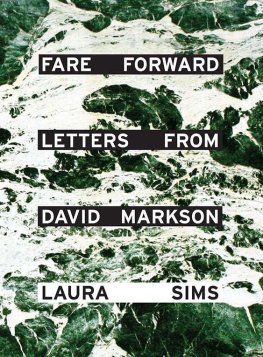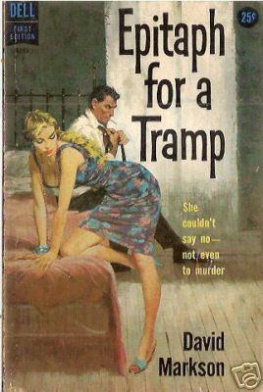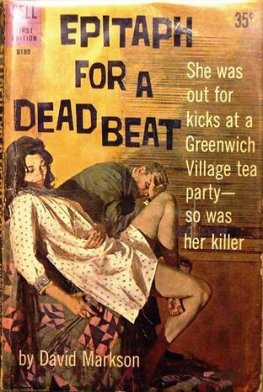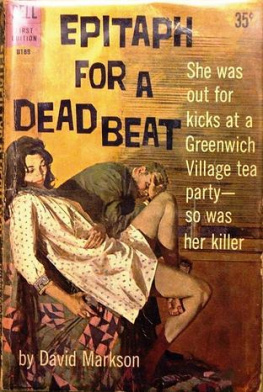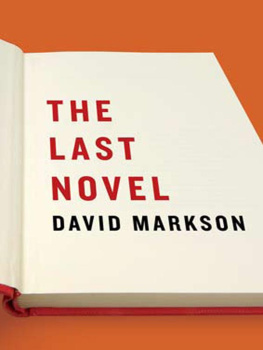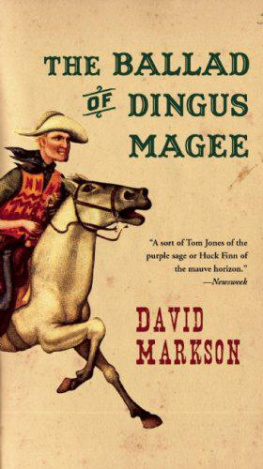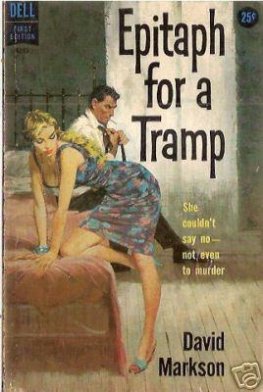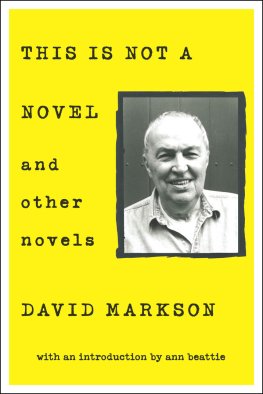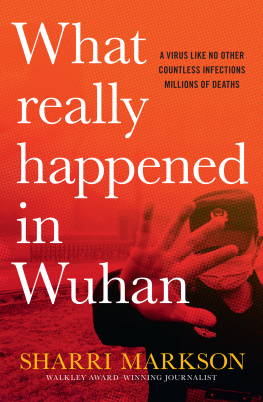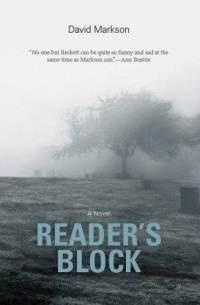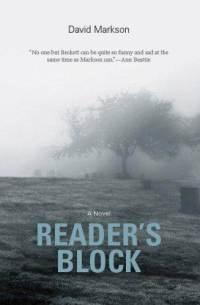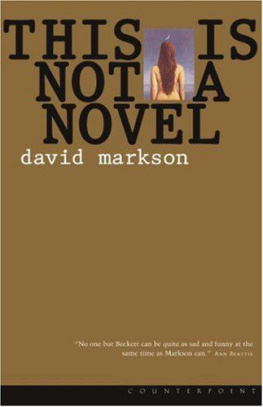David Markson
Fare Forward: Letters from David Markson
For David Markson, of course,
and his devoted readers
I first wrote to David Markson in February of 2003. In my impassioned fan letter I said:
Reading
Wittgensteins Mistress
was revelatory to me it rejuvenated my faith in the possibilities of literature. It served as solid proof (ironically enough) that there
was
a living soul out there someone who was not only trying to make it new, but who was succeeding wholeheartedly in the endeavoryour work astounds me for the perfect balance it strikes between innovation/art and compulsive readability. In fact, perfect is the one word I would choose to describe your work as a whole. Of all the books Ive read in the past five to ten years, your latest three novels
(Wittgensteins Mistress, Readers Block,
and
This Is Not a Novel)
have been the most important and influential to me personally.
I cringe now at the grandeur of my pronouncement but David wrote me back. He sent me a polite handwritten note the very next day, expressing his deep thanks for what Id written. I was surprised, and consistently thrilled, when we carried on from there exchanging postcards and letters more and more frequently, warming toward each other, and toward a genuine correspondence, with each one.
When I wrote to David, I would stew over the words and lines as if each note were a crucially worded poem. I even obsessed over which postcards to use which image would prove how erudite, how cosmopolitan I was? Which image would mark me as the philistine I feared myself to be (at least in comparison with the man who had written Wittgensteins Mistress)? David always sent plain white post office-issue postcards, but I chose ones from an eclectic collection Id begun to gather expressly for our correspondence; now those cards are accumulating dust in a storage drawer. Sometimes I browse through them and see images I chose with David in mind Caspar David Friedrichs Sunset (Brothers), or an early photograph of Gertrude Stein and I wish I could still send them to a certain address on West 10th Street.
Our correspondence and friendship spanned the years from 2003 to his death in 2010. It grew through the years, deepening with each letter and card but also, eventually, with several visits and increasingly frequent phone calls. It was an unequal relationship in many regards. David had an illustrious, if underappreciated, writing career behind him (and still before him, as his reputation grew in those final years); I was just beginning to publish poems in a serious way, and looked up to him as a model of what an avant-garde writer should be. We were also, age-wise, at very different stages of life. During those years, David endured various ailments and health scares related to old age, enjoyed the bittersweetness of a last romance, and then suffered its loss. He saw his final book, The Last Novel, published, and attempted to escape from what had become his habitual method of composition. During our seven years of correspondence, I got married, published a first book of poetry, lived in Japan for half a year on a fellowship, moved from New York to Wisconsin and back again, published a second book, lost a job I had cherished, and finally, by the time of Davids death, was seven months pregnant. Through it all, Davids notes punctuated and brightened my life, whether he was chiding me (Why why why do you do all those readings?), praising me (James Joycesaid to tell you, Mazel Tovwhich is Irish for Zowie.), or confiding in me (I am desperately trying to write a new book.). For seven years he was a great, glowing presence in my life, one to which I turned for literary companionship, mentorship (though he never critiqued my work, except to say it was puzzlingly difficult), and also, simply, for friendship.
In 2008, I finally began to come through on the promise Id made to David early on to spread the good word about his work. I published an essay, David Markson and the Problem of the Novel in New England Review, and then chaired a panel, In Celebration of David Markson, at the 2009 Association of Writers and Writing Programs (AWP) conference. Small gestures, ultimately, but public ones at least. I made a recording of the panel for David, and lent him a small tape recorder so he could listen to it and he did, over and over again, until the tapes wore out. I didnt see the tape recorder again until May of 2010, after months of promises to return it, when David finally sent it back. I hadnt heard from him for a couple of months, but I was too distracted by pregnancy and job-related distress to give his silence much thought. When I got the package, there was no note, which was very unlike David. I called him right away and left a message was he mad because I hadnt been in touch? Was everything okay? He returned my call later that day, sounding like his jovial self, so I felt reassured enough to put him out of my mind yet again. Several weeks later, a novelist friend of his wrote to tell me he had died. I was shocked and distraught, and felt that somehow Id failed him.
This book of letters is not meant to remedy that failure. Nor is it meant to be a comprehensive memorial to Markson the Man or even to Markson the Man of Letters it reveals a slice of Marksons life, as shared with one person in bits and pieces through the years, but it doesnt reveal, as a lifelong journal or a lifetime collection of letters might, the full arc of his thoughts and feelings, or the full spectrum of his character. The letters here provide a snapshot, not a panorama, but a snapshot is remarkably appropriate for Markson it gives a narrow, intense glimpse of a man whose work has been narrowly, but intensely adored. It reveals, in its intimate focus, the undeniable vibrancy of the voice of one of contemporary American fictions greatest innovators a voice his fans will recognize, and delight in; a voice that will surely delight newcomers to his work as well. In these casually written lines, Davids playfulness, his offhand literary erudition, his prickliness and stubbornness, his loving kindness, and above all, his damn good companionship, are on full display. These are attributes of the man that Im happy to reveal, and preserve, alongside his incomparable body of work.


Dear Laura Sims
Thank you, and then some, for the kind letter about my work truly appreciated.
Please do believe that, even though this response wont be half so good as you deserve. Not feeling well here, ergo Ive none of the energy it would take to convey how pleased I was how pleased I amto have received it. Ill reread it more than once, also.
Ive heard from the fellow writing the Review of Contemporary Fiction essay,1 actually, but am grateful youre thinking of doing something on my work for some other periodical.
News that may remotely interest you is that Ive only lately finished a new book, just now being submitted by the agent. Very like the last two,2 tentatively called Vanishing Point. Whether its any good or not, however, is another question altogether.
Hey, forgive this, please. As I said, a bum stretch. But I do send you all my best wishes and again, deep thanks.
Yours
David Markson
1 Review of Contemporary Fiction, a tri-quarterly literary journal from Dalkey Archive Press that features critical essays on innovative fiction. Henceforth RCF.

